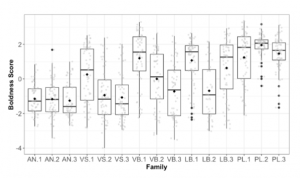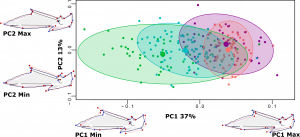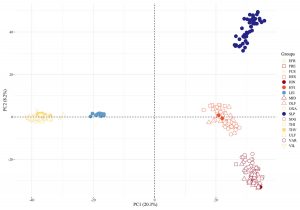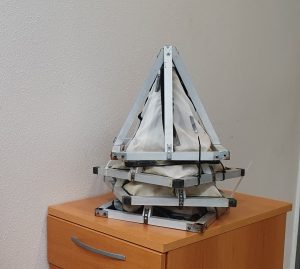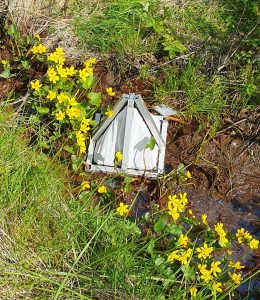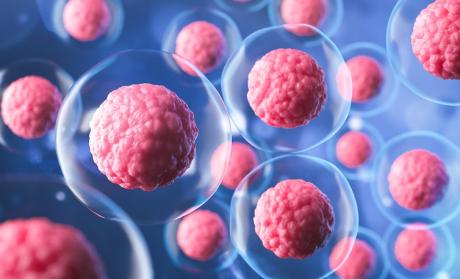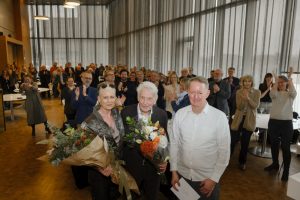
©Kristinn Ingvarsson
Opnunarávarp dagskrár í tilefni 90 ára afmælis Guðmundar Eggertssonar erfðafræðings.
Litla Torg, HÍ, 26. apríl 2023.
Kæru gestir, vinir og Guðmundur. Í dag fögnum við með Guðmundi Eggertssyni erfðafræðingi. Hann átti 90 ára afmæli á mánudaginn, 24. Apríl. Það er sérstakur heiður að fá að opna þennan fund. Lærlingar Guðmundar munu í dag fjalla um feril hans og störf, rannsóknir og áhrif.
Í gær voru 70 ár síðan þrjár greinar birtust um eiginleika og byggingu DNA, eftir Wilkins, Stokes og Wilson, Franklin og Gosling og Watson og Crick. Spurning hvort þetta sé tilviljun eða nauðsyn?
DNA sameinar allar lífverur á jörðinni, ásamt lögmálum lífefna, fruma, vistkerfa og þróunar. Titill fyrstu bókar Guðmundar var "líf af lífi". Viðfangsefni erfðafræði er hvernig gen kemur af geni. Og í dag sjáum hvernig af Guðmundi koma margir Guðmundar. Ekki bókstaflega litlir Guðmundar, heldur lærlingar innblásnir af fræðunum sem hann kenndi okkur og áhuga á sameindalíffræði sem hann smitaði okkur af.
Guðmundur hefur birt fjölda greina um bakteríuerfðafræði, hvernig erfðatáknmálið er túlkað af frumum og virkni. Einnig erfðafræði hitakærra baktería, sem lagði grunn að rannsóknum í líftækni og örveruvistfræði hverasvæða. Það verður fjallað minna um þessi flóknu og forvitnilegu kerfi í dag, og meira um söguna, störf, persónu og fyrirmyndina.
Áhrif hans á íslensk vísindi og sérstaklega líffræði eru ákaflega jákvæð, víðtæk og margslungin. Ég má til með að deila einni sögu. Grensásvegur 12 var kumbaldi sem lak í rigningu. Guðmundur mætti á slíkum dögum til að tæma og staðsetja fötur sem tóku við lekanum. Einnig fór hann upp á þak til að kítta.
Þrennt vil ég minnast á að síðustu.
Í fyrsta lagi vill ég minnast Sigríðar Helgu Þorbjarnardóttur sem féll frá alltof ung. Hún var sérfræðingur Líffræðistofnunar og vann mjög náið með Guðmundi, var meistaraleiðbeinandi minn og margra annara nemenda. Hún var sérlega klár og vönduð. Ég naut þeirrar forréttinda að hafa bæði Siggu og Guðmund sem leiðbeinendur.
Í öðru lagi vil ég minnast gæsku Guðmundar. Hann er alltaf jákvæður og hvetjandi. Munið þið eftir styggðaryrði eða ofsakasti hans? Nei, því slíkt gerðist ekki. Jafnvel þegar hann og aðrir voru að spyrna við gerræðislegum hugmyndum um gagnagrunn á heilbrigðissviði.
Í þriðja lagi er það frábært skopskyn. Guðmundur hefur mikið gaman að góðu gríni. Hann laumaði litlum bröndurum inn í umfjöllun um tRNA og önnur apparöt frumunar, og lagði oft glæru með bröndurum úr New Yorker eða sambærilegu á skjávarpan áður en fyrirlestrar hófust, nemendum til ánægju.
Að síðustu, hjartanlega til hamingju með afmælið Guðmundur. Ágæta samkunda, ég lýsi þetta málþing og bjórfund settann.
Þakkir fá aðrir í skipulagsnefnd, Sigríður Rut Franzdóttur, Snædís Björnsdóttur, Eiríkur Steingrímsson og Zophonías O. Jónssoni. Einnig þökkum við Verkfræði og náttúruvísindasviði og Líf- og umhverfisvísindadeild fyrir fjárhagslegan stuðning.
Söngfjélagið syngur kl 17:00.

